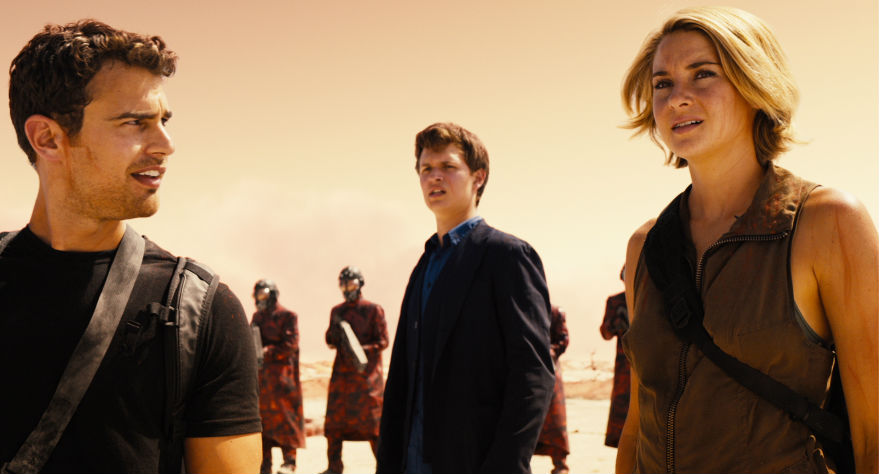
The sloppy, infuriating YA series continues to lose steam.

The sloppy, infuriating YA series continues to lose steam.
The Divergent series has, in many ways, been doomed from go. Propping up the dystopian hero’s story is a clumsily conceived, confusing “faction” system that makes so little sense it can cause spontaneous combustion if meditated on for extended periods of time. So, here we are, considering Allegiant, the third entry in the series based on Veronica Roth’s popular YA books, directed by Robert Schwentke. While the overlong, bland, uninspired, nonsensical movie didn’t cause said spontaneous combustion, my explosive demise is imminent; there’s another one coming out next summer, part two of this miserably drawn-out finale, and if there’s any silver lining, it’s that we can at least say there’s an end game in sight.
Again, we join Tris (Shailene Woodley) as she continues to unravel the mystery of “the founders,” the people who set up the cockamamie faction system however-many years ago. To catch up: Until the final events of Insurgent, Chicago had been divided into districts, whose residents are assigned according to their dominant personality traits. Upon opening a mystery box left by the founders, Tris and the rest of Chicago learns that there are people beyond the sky-high city walls that have confined them for all this time, a revelation that effectively collapses the longstanding faction system and sends plucky Tris, her super-soldier boyfriend Four (Theo James) and their rebellious friends on a quest to find out, once and for all, what’s beyond the wall.
An underwhelming run-n-gun sequence follows our heroes as they evade military forces sent by Four’s mom, Evelyn (Naomi Watts), who in the last movie disposed of the tyrannical Janine (Kate Winslet), only to (predictably) adopt the former leader’s totalitarian tendencies. The group makes it over the wall, but not before two of the series’ prominent characters of color—played by Mekhi Phifer and Maggie Q, who are each given virtually no dialogue as a parting gift—are gunned down, likely to make room for the new influx of white actors we’re about to meet (Daniel Dae Kim shows up for a second too, another minority bit-part designed to create a false sense of diversity). Not an uncommon Hollywood practice, but frustrating nonetheless.
On the other side of the wall, we find a Martian-looking wasteland, an army bearing futuristic weaponry, a new city (built, amusingly, on the remains of O’Hare International Airport), and a benevolent leader David (a sleepy Jeff Daniels), who informs Tris that she is the sole success of the “Chicago experiment” the founders set up all those years ago. There are details, but they’re too stupid and uninteresting to get into here. The basics are, Tris is the key to the prosperity of the human race, and David, who (surprise!) isn’t as benevolent as he appears to be, pampers her into ignoring her friends to concentrate on fulfilling his Hitler-y dreams. Four, Christina (Zoe Kravitz), and Tris brother Caleb (Ansel Elgort) do their best to snap Tris out of her self-aggrandizing daydream while also dealing with a civil war that’s broken out back in Chicago between Evelyn and Johanna’s (Octavia Spencer) respective followers.
The logic of the faction system was already frustrating, but now the series introduces this master-race narrative that only makes things worse. It simply isn’t clear what the message is Roth and the filmmakers are trying to get across. Is it that everyone’s special? No one is special? Tris seems pretty special. So do her friends. They all specialize in one thing—Four kicks major ass, Caleb’s good with tech—but the movie seems to be saying that their laser career focus is the result of genetic tampering or something, which leads us back to the secret behind the faction system mess. I can feel my body wanting to burst now, as I type this.
The enjoyable thing about Insurgent was that the action was urgent and inventive, but the set pieces here feel more trite and way less entertaining. The folks beyond the wall have nicer looking lasers and flying bubble ships than the dirty trucks and machine guns we’ve seen in the previous installments, which is a welcome change, but one can’t get over the fact that every bit of art design we see feels woefully generic, as if they were scrounged from a bin of unused video game assets. Unexpectedly missed are the surrealistic dream sequences from the first movies.
Perhaps the biggest head-scratcher of all is how a movie can fail so epically with such an amazing cast of seasoned vets and young stars populating the screen at any given moment. For goodness sake, you’ve got Spencer, Watts, and Daniels bouncing off of Woodley, Elgort, James (who’s not half bad here, actually), Kravitz, and Miles Teller, whose charisma can make the most terrible line work, at least to some extent. The Whiplash star is a standout as the opportunistic Peter, whose flips in allegiance have been enjoyable throughout the series. My feeling is that the cast makes a terrible script feel somewhat coherent and emotionally grounded, and for that the unlucky few who actually see this movie in a theater should be thankful.